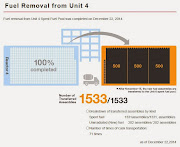What's the point of holding a white balloon and chanting "Saikado Hantai!" to the tune of an organization with strange personalities and creed every Friday at Prime Minister's Official Residence, as if it's some kind of fashion statement to do so? Not much.
Particularly when just about everybody, from the top government officials on down and including you and me, continue to (or choose to) be ignorant of what has been happening to the people who had to evacuate their homes after the March 11, 2011 nuclear accident, with no prospect of going back any time soon.
An organization called "Enechen" ("energy change", in Japanese English) is asking for help so that they can at least provide hot meals to the 200 evacuees from Futaba-machi who continue to live in the classrooms in a closed high school building in Saitama Prefecture where the town's government has temporarily relocated. They are mostly elderly residents, and they have nowhere else to go.
After nearly 17 months since the accident, the country is quite happy having them live in classrooms with card board partitions.
From the organization's website (8/12/2012):
<双葉町避難所(埼玉県旧騎西高校)炊き出し支援プロジェクト>
Project to provide Futaba-machi Shelter (at former Kisai High School in Saitama Prefecture) with hot meals
2012年8月現在、双葉町避難所のお年寄り約200名は、昨年2011年3月の避難から1年4ヶ月経った今もなお、廃校にて段ボールで仕切った集団のお部屋で、3食お弁当という生活を続けられています。
As of August 2012, about 200 elderly residents at Futaba-machi Shelter continue to live in the rooms partitioned with corrugated cardboards in a closed school building, with all their meals in bento (boxed lunch/dinner), 1 year and 4 months since they evacuated there.
炊き出しも現在は味噌汁の炊き出しが週に1度あるだけで、ほとんどなくなってしまったそうです。
Hardly any hot meals are served any more, except for hot miso soups once a week, we've learned.
避難者の方々に暖かいご飯を提供したい、という思いからこの企画を立ち上げました。
We want to provide these people with hot meals, so we have launched this project.
<双葉町避難所(埼玉県旧騎西高校)の状況>
Current condition of Futaba-machi Shelter (former Kisai High School in Saitama Prefecture)
福島県の双葉町、福島第一原発事故を受けて事故直後埼玉スーパーアリーナに避難された方々は、2011年3月30日以降、埼玉県加須市の廃校である「旧騎西高校」に移動避難しました。
People from Futaba-machi, who had evacuated to Saitama Super Arena right after the start of the Fukushima I Nuclear Power Plant accident, moved to the building of former Kisai High School in Kazo City in Saitama Prefecture after March 30, 2011.
それから約1年4ヶ月、当初1000人以上いらした避難住民の方々はそれぞれ仮設住宅などに移転しましたが、2012年8月現在で約210人の方々が今も廃校の校舎内で生活しています。
It's been about one year and 4 months since then. Initially there were more than 1,000 evacuees staying at the high school building, but most have moved out to temporary housing. However, as of August 2012, there are still 210 people living in the school building.
ほとんどの方がお年寄りで、自立した生活をするにさまざまな理由や問題を抱えていらっしゃるのが現状のようです。
Most of them are elderly people, and it seems they have various reasons or problems that prevent them from living independently.
先日視察に行ってまいりましたが、食事は避難生活1年4ヶ月経った今も3食お弁当のようでした。寝泊まりしているお部屋に冷暖房は完備されているようですが、体育館の一部を段ボールで仕切ったり、各教室に別れ、1つの部屋に複数名が一緒に布団を敷いて生活していらっしゃるとのことでした。
We went to visit them the other day. After a year and 4 months at this shelter, people still receive bento (meal in a box) for daily three meals. The rooms where they sleep seem to be fitted with air conditioning systems. People partition part of the gymnasium with cardboards, or use classrooms with other people, to spread their futons to sleep.
お食事は一定の場所で受け取り、各自お部屋に持ち帰って食べますが、お部屋の位置によっては受け取り場所も遠く不便を感じていらっしゃるお年寄りも多いようでした。
Meals are distributed at a certain location within the school building, and people take the meals [in bento box] to their rooms to eat. But depending on the location of their rooms, the location to receive meals is too far, and many elderly residents are finding it inconvenient.
...現在、避難所に残られている約200名の方の今後については、まだ何も明確に決まっていません。\
Nothing has been decided what will happen to these more than 200 people at this shelter.
いつまでこのような生活が続くのか、見通しも付かないまま、毎日時は過ぎています。
Time passes, with no prospect for the future.
国は,行政は何をしているのでしょうか?
What have the national government, and the municipal government, been doing?
まだまだ原発事故で苦しんでいる方はたくさんいます。賠償金すらほどんどの方に行き渡っていません。
There are many people who still suffer from the nuclear accident. Most haven't even received the compensation money.
そんな中政府は支援もおざなりに、再稼動、利権絡みの除染を優先し、原子力規制委員会にとんでもない人事案を掲げています。
But the government's priorities are the restart [of the nuclear power plants], decontamination that benefits big businesses, and appointment of commissioners [who are nuclear industry insiders] for the Nuclear Regulatory Commission.
呆れてものも言えませんが、負けずに助け合い、手を取り合って、出来る事から1つずつ、頑張りましょう!
We are appalled, speechless. But let's try and help each other, and together we will do what we can, one thing at a time.
The site has the photographs of the shelter (former high school building), kindly avoiding photographing the elderly residents who still remain there:
"Kizuna" support messages (Uggghhh...):
Public space inside the building - TV room, telephone center, physical therapy clinic:
The organization is asking for donations at their website for this particular project, here.
Japan is still the third largest economy in the world, by the way, after the US and China, giving billions and trillions of yen to international organization or squandering equal amount of money trying to cheapen the currency.







 Tokyo Time
Tokyo Time
![[Most Recent Quotes from www.kitco.com]](http://www.kitconet.com/charts/metals/gold/t24_au_en_usoz_2.gif)



4 comments:
Suffering unseen in silence
Seems the Japanese way
Gaman taikai
I understand that Enechen wants to protect the privacy and dignity of individuals, but this story would be even more powerful (pulitzer powerful?) if some individuals could allow their personal stories to be told and their pictures taken.
Please Japan, you must stand up and make your voices heard. What is happening to these victims is shameful. Expose it internationally with video. Embarass Noda and the DPJ. Maybe then the Japanese government might take notice and improve the lives of these 210.
Don't worry, Japan is still better off than Germany.
We are already chaining elders to save money for the millions of muslim welfare immigrants, whose annual costs to the German people are already at least 50 billion euros annually, according to the Spiegel.
http://www.spiegel.de/gesundheit/diagnose/fixierungen-in-pflegeheimen-bettgitter-und-gurte-fuer-den-rollstuhl-a-847529.html
Japan and TEPCO both have plenty of money to buy hot meals for those people. Asking me to do it for them is quite can insult, especially after the folly of Fukushima. I want TEPCO and Japan to pay for those hot meals and anything less is 100% unacceptable.
I'm in contact with people from FUTABA and people living in this school. Latest news : the meals must now be paid for.
Most people did not yet receive money for the houses they've lost.
Post a Comment